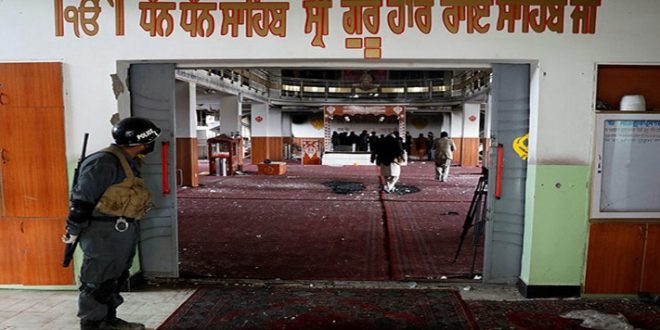The Wednesday terrorist attack on our Sikh compatriots in Kabul city that killed at least 25 innocent worshippers inside a Gurdwara (Sikh temple) in the old part of the capital, reminds Afghans of cowardly efforts by the enemies of independent and united Afghanistan who try to divide the Afghan people by architecting and financing ethnic and religious wars. The Daesh terrorist group, who has previously claimed responsibility for many attacks on religious gatherings, said that it was behind the Gurdwara attack. Such cowardly attacks cannot make rift among people of Afghanistan Muslims, Sikhs and Hindus who have lived as members of a great family in the course of history. Terrorists and their masters in foreign intelligence agencies know this fact, but still do not want to abandon stupidity. Did they manage to divide the people of Afghanistan by organizing ethnic and religious wars in the past? No. Afghans braved such cowardly wars since 1992 until now, but have consolidated unity and solidarity. Since the US-Taliban peace deal and the subsequent one-week reduction in violence, the Afghan security forces have somewhat dropped their guard. It’s because the recent incident is a second instance of the Daesh group’s latest assaults on minority groups in the country. Earlier this month, a gathering of the Hazara community was targeted by Daesh when scores of innocent people lost their lives. Surprisingly, this is while the Afghan government boasts of crushing the extremist outfit in the country and the US celebrates this victory by giving partial credit to the Taliban for contributing to suppressing the group. If Daesh group has been defeated, who are these gunmen carrying out the attacks? However, the irony of the situation is the increased scale of violence despite the peace deal and the assumption of the Taliban’s role by the Daesh. Indeed, all of this is linked to the developments in the peace process, whose postponement gives rise to such violence. The fact that the Afghan government and the Taliban communicated via videoconference on Sunday is something that would help revive the peace process. While such conferences don’t herald the beginning of an ‘official’ intra-Afghan dialogue, they definitely serve as an ice-breaker. Due to the coronavirus pandemic, the warring parties should continue to hold such conversations and find a solution to the main sticking point – prisoner swap – that has caused a breakdown in the peace process. The impasse stemming from prisoner release issue threatens the US-Taliban deal signed in February and also paves the way for further violence. The current issues Afghanistan is grappling with –increased violence and political dysfunction – are affecting the efforts to contain the spread of coronavirus as well. Moreover, if the feuding political leaders don’t get their act together, there is no way they can deal with other critical national issues because of their infighting for power – something that has affected the morale of Afghan security forces. However, the security forces shouldn’t concern themselves with the political dynamics and remain proactive in protecting Afghans and preventing attacks on them. Therefore, to prevent further chaos in the country resulting from various fronts, unity is needed in Kabul and the focus should now be on the intra-Afghan dialogue. The Afghans form all walk of life offering deepest condolences to our Sikh community. The extremists and filthy proxies know no humanity.

 Afghanistan Times
Afghanistan Times



